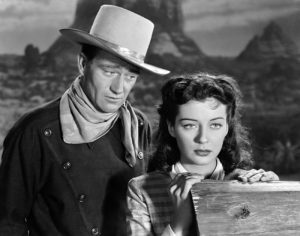 One of my all-time favorite cowboy movies is the 1966 Howard Hawkes directed El Dorado. What a great movie! John Wayne plays a quintessential John Wayne role. Robert Mitchum, who is one of the only people who could rival John Wayne for coolness, co-stars. James Caan plays the supporting role of Mississippi, who can’t shoot so he uses some sort of crazy elephant gun with a wicked scattershot. Some old guy plays “Bull” who is deputy/comic relief. Ed Asner is the evil Jason; there is a beautiful lady whose name I don’t know who plays the saloon owner Maudie (she’s in love with Wayne, of course).
One of my all-time favorite cowboy movies is the 1966 Howard Hawkes directed El Dorado. What a great movie! John Wayne plays a quintessential John Wayne role. Robert Mitchum, who is one of the only people who could rival John Wayne for coolness, co-stars. James Caan plays the supporting role of Mississippi, who can’t shoot so he uses some sort of crazy elephant gun with a wicked scattershot. Some old guy plays “Bull” who is deputy/comic relief. Ed Asner is the evil Jason; there is a beautiful lady whose name I don’t know who plays the saloon owner Maudie (she’s in love with Wayne, of course).
It has everything a western movie should have. See the film, then thank me. At the heart of the movie is the friendship between Wayne’s character (Cole Thornton) and Mitchum’s character (J.P. Harrah). Harrah is the sheriff of El Dorado, but their friendship goes way back, both having been gunslingers whose paths have crossed for decades (apparently). Well, Harrah hits a rough patch and ends up in a drunken stupor on a two month bender at the unfortunate moment when the loathsome Jason decides to take over town. Wayne comes back to town to sober up his old friend so they can shoot everybody bad and rescue El Dorado.
There are humorous scenes aplenty as Cole and Mississippi try to break liquor’s hold on the sheriff. But one painfully serious moment comes when J.P. makes his way to the saloon to try to buy some more liquor. Jason and his men mock and ridicule the sheriff. He limps back to the jailhouse with his bottle a man shattered in spirit. He repeats over and over again, “They laughed at me, Cole. They laughed at me.” He is ashamed of himself. “They’ve been laughing at you for months, you were just too drunk to know it,” Wayne replies.
A short time later Mitchum’s J.P. is ready to charge back into that same bar to apprehend one of the bad guys against overwhelming odds. Mississippi expresses some concern about his wherewithal, but Wayne responds, “They laughed at him, Mississippi. That’ll make the difference.” And it did.
Sure it’s a cowboy movie. Fiction. But there is truth in it nevertheless. The truth here? That laughter was a motivator. And what about the laughter? Shame. Shame was the motivator. J.P. was willing to die in an effort to wipe out his shame.
We live in a day and age in which shame is a dirty word. No one should ever be made ashamed of anything. We turn up our noses in disgust at any hint of shame. We find shame shameful. We are disgusted by the use of shame. The Scarlet Letter of Hawthorne’s heroine is shameful in the extreme. And things which were recognized as being shameful in previous generations are touted with pride today.
But living in a shame-free culture has its costs. For one thing, shame is a powerful motivator. Before you shame me for my praise of shame, let me ground my argument biblically. Christ uses shame as a motivator. Mark 8:38 38 If anyone is ashamed of me and my words in this adulterous and sinful generation, the Son of Man will be ashamed of him when he comes in his Father’s glory with the holy angels.” Jesus says that if anyone is ashamed of him before men, he will be ashamed of them when he comes.
Who wants Jesus to be ashamed of them on Judgment Day? I don’t! One of the greatest motivations driving my life is the earnest desire of my heart to hear, “Well done, thou good and faithful servant!” as opposed to “I’m so ashamed of you!” Is that a bad motivation? Jesus didn’t think so. Now I don’t favor shame as a primary motivator. But there are occasions when shame is appropriate, when shame is a great good. Shame is used of God as a motivator that leads to changed behavior, to repentance, to restoration, to receiving grace, to forgiveness, to wholeness. It is a symptom of the disease of guilt. Shame entered the world when guilt entered the world (which entered the world when sin entered the world). Adam and Eve were immediately ashamed before God. They sought covering. The covering for sin is Christ. The answer to shame is Christ. Shame should drive us to Christ. And when it does, it is a wonderful gift.